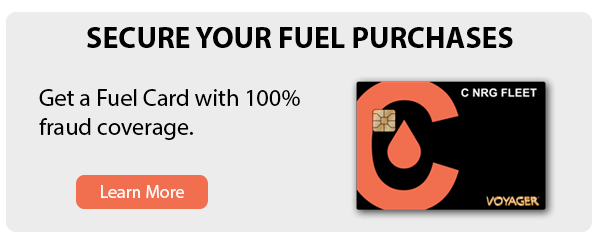In today’s climate of soaring fuel prices, the last thing any fleet manager needs is to lose thousands of dollars because of fuel card theft or skimming. Fuel cards are a crucial part in the line of defense against fraud, equipped with advanced controls, real-time alerts, and various fraud coverage options. But which fuel card offers the best protections? In this post, we’ll compare the security measures and coverage types of leading fuel cards.
Fraud Protection Comparison
Below is a chart that shows the fraud coverage of top fuel cards.
| Wex | Fuelman | Coast | CFN | Voyager |
|---|---|---|---|---|
| No Fraud Coverage | $10,000 or $25,000 | $25,000 | $25,000 & $10,000 | Full Coverage |
NOTE: Fraud coverage applies only to stolen or skimmed cards and card info. It does not cover employee misuse.
Coverage Details
The fuel cards that do provide fraud protection come with specific terms and conditions. Let’s take a closer look at some of their policies and restrictions.
Fuelman
Fuelman only offers fraud liability protection for their enterprise and pro upgraded plans that have at least 10 cards. Coverage is capped at $10,000 per card and a maximum of $25,000 per year. For example, if you have three cards compromised, you would receive full coverage for two and only partial coverage for the third, leaving you without further protection for the rest of the year. They also require you have basic security controls enabled for all cards and report the lost or stolen card within five days. Failure to meet those requirements will result in no coverage. For more details, check Fuelman’s terms and conditions here and go to page 10.
Coast
Coast fuel cards give you up $25,000 of coverage per calendar year, through their “Fuel Fraud Guarantee”. However, you must have “SMS security” via a phone number enabled as well as either manual odometer collection at the pump, or telematics integration that is configured to automatically decline fuel transactions when the vehicle is too far from the merchant (gas station) to qualify. If you are interested in finding out more about their terms go here.
CFN
The CFN fuel cards have two types of coverage, fraud and lost or stolen cards. Their fraud coverage is up to $25,000 per card for the 45 calendar day period prior to the card being deactivated. Lost or stolen card coverage is a maximum of $10,000 per card for the 5 calendar day period before the card was deactivated. Both types of coverage only cover fuel purchases, so if you have the cards set to purchase non fuel related items like maintenance parts or food, CFN will not cover those expenses. They also will not cover hand tags or bulk loads. To qualify for either type of coverage you must have transaction limits and gallon limits per day enabled on your cards.
Voyager
The Voyager fuel card has zero liability protection meaning you will not be held responsible for fraudulent transactions made with your fuel card. Just like with Fuelman and Coast you must have basic security controls such as spending limits and driver ID inputs enabled on your cards. Along with the coverage, Voyager also uses advanced AI to monitor transactions in real-time, alerting you instantly if any suspicious activity is detected. For a complete overview of Voyager’s terms and to see the full list of required settings, visit here and go to page 25 or section 9.
Conclusion
With this information you can make a well-informed decision on how to best protect your fleet against fuel card theft and fraud.

